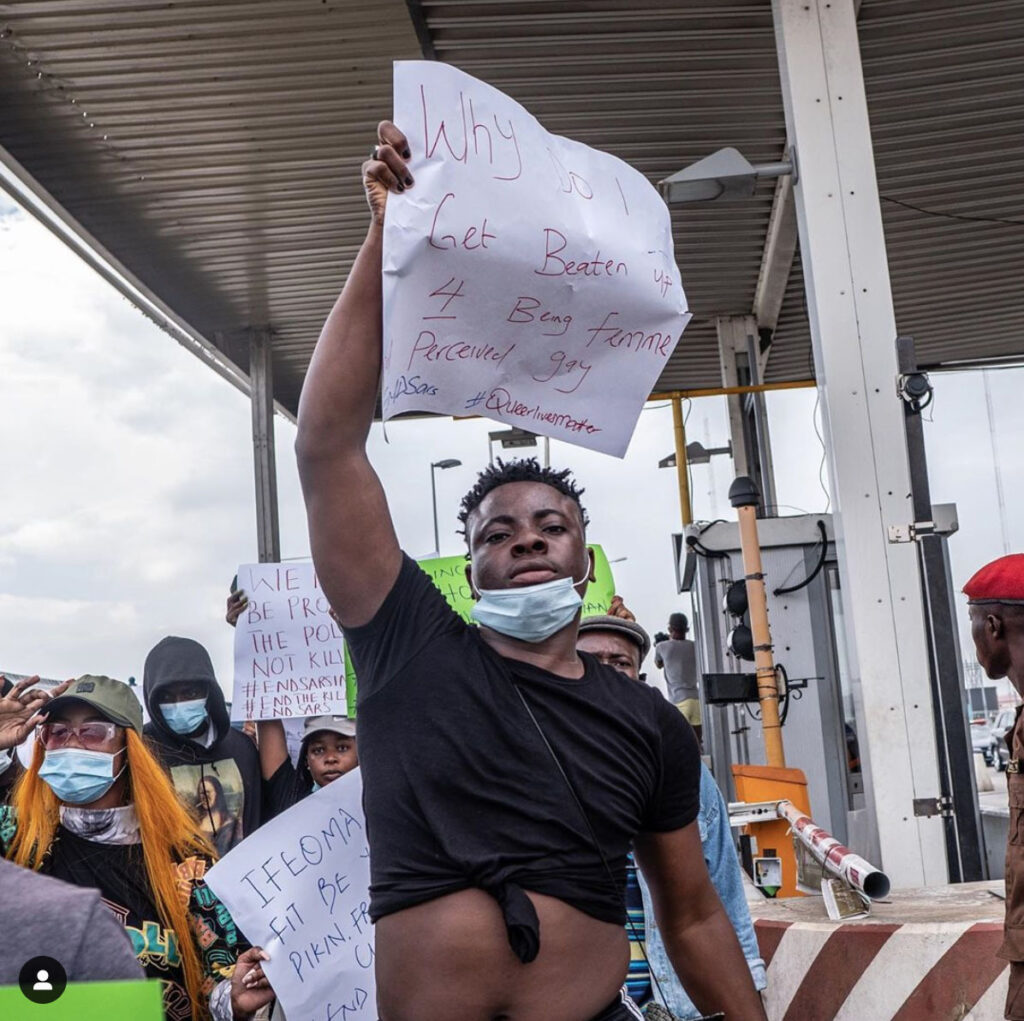Fed up: Demonstrators protest police brutality at the Lekki toll gate in Lagos, Nigeria, on October 20 this year. The Nigerian government imposed a 24-hour curfew to clamp down on protests against Sars, a police division accused of abuse. Photo by Adetona Omokanye/Getty Images)
On October 10, a video surfaced online of Matthew Blaise, a Nigerian LGBTQ+ rights activist, chanting at the top of his voice that queer lives matter. He was at a location of the #EndSars protests in Lagos, Nigeria.
Just a few days after the country’s 60th independence anniversary on October 1, young Nigerians took to the streets demanding an end to police brutality. A unit of the Nigerian police force, the Special Anti-Robbery Squad (Sars), had become notorious for brutalising and harassing young Nigerians whom they profiled as criminals or fraudsters due to their hairstyles, grooming, or the electronic gadgets they carry.
The protest, which started in Lagos, spread to other cities and towns, uniting Nigerians against a common enemy. Nigeria is a country torn not just by ethnic and religious differences but also along ideological lines; coming together in unity of purpose is no easy feat.
The government soon announced that the police unit had been disbanded and signalled that it had hearkened to the people’s demands, which were not just an end to the Sars unit but also a reform of the entire police force, compensation for the families of the victims of police brutality, and punishment for the police officers who had been involved in extrajudicial killings.
Many other queer people across the country joined Blaise in the protests. Victor Emmanuel, an openly gay man in Nigeria and a YouTube vlogger protested in Enugu, a city in southeastern Nigeria, and attributes the inspiration to Blaise. “His actions and the video inspired me as well as many others to write #QueerLivesMatter on our placards alongside #EndSars.”
 (Image: @yagazieemezi/Instagram)
(Image: @yagazieemezi/Instagram)
While Blaise had only been gaped and stared at in Lagos, Emmanuel had experienced hostility in Enugu. He and other queer people at the protests were verbally attacked and were asked to bring down their placards. On another occasion, a man tauntingly mimicked Emmanuel’s effeminate friend: it was a direct attempt to incite the protesters to violence. Emmanuel and his friend bore the humiliation and resisted reacting for fear that other homophobic protesters would gang up against them.
Emmanuel’s experience isn’t an isolated one. There were reports across social media of similar attacks on LGBTQ+ people in the organised protests in different towns and cities. Other protesters felt the queer community was trying to hijack the protest for their own cause.
But queer profiling was also a reason for Sars brutality. Although Emmanuel hasn’t been harassed before, he says his friends with a preference for androgynous dressing or who are ostensibly effeminate have been harassed and dehumanised by this rogue police unit.
After more than a week of continuous peaceful protests across the country, the demonstrations turned violent. Protest leaders say that the violence was caused by state-sponsored thugs who infiltrated the protests, attacking participants and destroying cars. In response, state governments imposed curfews.
In Lekki, Lagos, on the night the curfew was imposed, armed military men shot at protesters who were only waving their flags and singing the national anthem. There are reports of a similar occurrence in Alausa, Lagos. The government is denying these attacks, despite Instagram Live video evidence that attests to them. At the same time, there have been multiple reports of looting and the burning of properties, including malls and supermarkets.
But the spirit of the Nigerian youth isn’t dampened. The call for an end to police brutality has filtered to calls for better governance; protests have continued in some cities; and online the hashtag EndSars is still trending. The general consensus is that it’s time for the youth to restrategise and reclaim their country from the menace of bad leadership.
At this moment, queer Nigerians are finding their voice to stand up against the country’s homophobic laws. In 2014, Nigeria’s former president Goodluck Jonathan signed into law the Same-Sex Marriage Prohibition bill. The bill not only banned same-sex marriage, but it also criminalised sex between people of the same gender and organisations advocating for the rights of the LGBTQ+ community. The law deems these as crimes punishable by up to 14 years in prison.
Emmanuel and Blaise, along with two others, are creators of the hashtag #EndHomo-phobiaInNigeria. They have through online activism called for an end to the endemic homophobia that is damaging the lives of Nigeria’s queer community.
Emmanuel is geared to take this activism to the streets of Nigeria to demand that the Same-Sex Marriage Prohibition Bill be repealed. In fact, he’d been motivated to do this
before the #EndSars protests: “I was planning a queer protest myself before #EndSars protest began,” he said.
He’d also planned it for this month, the month of Nigeria’s independence anniversary, to “remind Nigerians that not all of its people are free, that Nigeria strips members of its society of their fundamental human rights”. But the #EndSars protest has proven to be a learning period for him. He’s confident that the resilience shown by other queer protesters during the protests — despite the homophobia they experienced — is a testament to the fact that Nigeria’s queer community is ready to demand its rights.